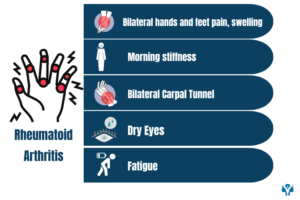SHARE
Rheumatoid arthritis is one of the most common autoimmune diseases. It is essential to recognize this disease’s most common signs and symptoms. Getting an earlier diagnosis will maximize your chances of getting appropriate treatment and stop inflammation.
In this article, I will describe the five most common signs and symptoms of rheumatoid arthritis, from joint pain to stiffness to carpal tunnel syndrome.
What is Rheumatoid Arthritis?
Rheumatoid arthritis, commonly called “RA” is the most common autoimmune disease affecting the joints. It involves an estimated 1.5 million people in the United States. Some people are more prone to developing RA than others. These risk factors include
- biological sex
- genetics
- smoking
- alcohol consumption
- poor nutrition
- poor dental hygiene, and more.
For example, females are twice as likely to develop RA than men. All of these risk factors can increase your chance of developing the condition.
What are the common symptoms of RA?
It is essential to recognize the signs and symptoms of RA early on, as left undiagnosed and untreated, this form of arthritis can become a severe and disabling disease. Treating early and appropriately will get you back on track, and your chances at a better, if not normal, life are so much higher than if your diagnosis is delayed. Here is a video that you can watch on my Youtube Channel.
Joint Pain and Swelling
Many patients with RA gradually develop pain and swelling in the joints, especially in the hands and feet. However, other joints like shoulders, hips, knees, ankles and even elbows can be affected. These will be painful, swollen, and tender to the touch. Tenderness with palpation, or pain when you touch things, is another common symptom.

Here’s a tip: to tell if your hands are swollen, try looking for some of these signs: you can’t take off a ring, make a full fist, have weakness in your hands, difficulty opening jars, doors, or dropping things.
The pattern of joints involved is specific for RA: it is always symmetric. So, both hands, both feet, both shoulders, both knees, both ankles are affected simultaneously.
In rare cases, the pain starts in only one joint, for example, one knee. This generally occurs at the beginning of the disease and later progresses to a symmetric pattern. Another rare symptom is migratory pain, so a patient notices pain in one joint, and then it moves onto others. So, for example, you start with pain in the knee. Then, the pain in the knee goes away but resurfaces in the shoulders. Then, the shoulder pain goes away but shows up again in the wrist, and so on.
Morning Stiffness
Many patients experience morning stiffness, defined as slowness or difficulty moving the joints in the mornings. This occurs when trying to use hands, getting out of bed, or staying in one position for too long. This stiffness is always prolonged, usually lasting for more than an hour.
I always ask my patients to keep a diary of their symptoms and tell me how long they experience morning stiffness and if it improves or goes away with movement. This is a sign that the stiffness is caused by inflammation of the joints, like in RA.
Bilateral Carpal Tunnel Syndrome
Carpal tunnel syndrome is a common and painful disorder caused by the compression of the median nerve in the carpal tunnel, located in the wrist. Most of the time, it is caused by overuse of joints and repetitive movements such as typing and excessive writing.

Often, this condition only exists on one hand, but there are a few situations responsible for bilateral CTS, and one of these is RA.
Others include
- hypothyroidism
- pregnancy
- diabetes
So, as I was saying, carpal tunnel syndrome is another cause of RA, especially if it is bilateral.
This is because the swelling of the hands and inflammation strain the median nerve, causing CTS. Since the inflammation occurs symmetrically, so will CTS be on both sides.
Dry Eyes
Most patients suffer from dry eyes, which occur when our eyes tear and cannot provide enough moisture. This can cause redness, vision problems, and a stinging, burning, or scratching sensation in the eyes.
If we receive complaints about dry eyes, we usually test patients to see if lacrimal gland secretion is affected. If that is the case, we call this secondary Sjogren Syndrome.

Other patients develop redness or inflammation of episcleral tissues, the white part of the eye. This is called episcleritis. As a result, patients can suffer from redness, itching, pain, and even vision changes.
A more dangerous eye complication of patients with RA is called scleritis, which is the inflammation of especially the deep episcleral and scleral tissues. If is left untreated, this can lead to scleromalacia perforans, a very severe complication of untreated RA, as it can lead to severe damage to vision, vision loss, and potential blindness. While a rheumatology fellow, I saw one patient with scleromalacia perforans, which is not easily treated. This is why it is essential to pay attention to your ocular health.
Fatigue
When you hear the word “fatigue,” you might think of the tired feeling you get when you don’t get enough sleep or after you finish an intense workout. However, fatigue is different: it is a persistent state of tiredness that interferes with daily activities.
Fatigue is not caused by lack of sleep or activity levels, so it will not go away even if you try to rest.
Let’s go back to RA. Patients with RA often feel worn out, drained of energy, and experience overwhelming and uncontrollable tiredness. Some patients lose all interest in anything.
This is fatigue… but why does it happen?
There are many reasons why RA patients experience fatigue.
The first is because of chronic inflammation. The constant fight between your immune system that is on a mission to fight your body will tire you out, so the fatigue will be persistent as long as the inflammation is uncontrolled.
Another reason suspected by some researchers is that fatigue is caused by antibodies affecting your central nervous system.
Other RA symptoms can also affect fatigue. For example, joint pain can cause poor sleep, which for prolonged periods, lead to fatigue.
Also, dealing with an autoimmune disease can cause stress, discomfort, frustration, and even depressed feelings. These are all associated with the development of fatigue.
There are many other causes of fatigue, and your doctor will help you sort them out, including vitamin deficiency and anemia.
Where can you ask for help?
If you develop bilateral joint pain, swelling, and inability to properly use your joints, you should consult a rheumatologist. There are many types of inflammatory arthritis, but rheumatoid arthritis is the most frequent autoimmune disease I see in my clinic, Rheumatologist OnCall. Many patients that develop bilateral carpal tunnel should be sent for evaluation by a rheumatologist in the absence of other conditions. I have seen many cases of patients who had carpal tunnel surgery before being evaluated for inflammation. As a rheumatologist, I listen to the patient and thoroughly analyze the pattern of the disease. This allows me to diagnose and treat patients earlier and more appropriately. If you are looking for a consultation for arthritis or autoimmune disease, schedule on our website, Rheumatologist OnCall. I am happy to evaluate and treat you with the most comprehensive and personalized approach that will integrate the most cutting-edge science with integrative medicine, which includes nutrition, supplements, stress management, mindfulness, exercise, and sleep management.














